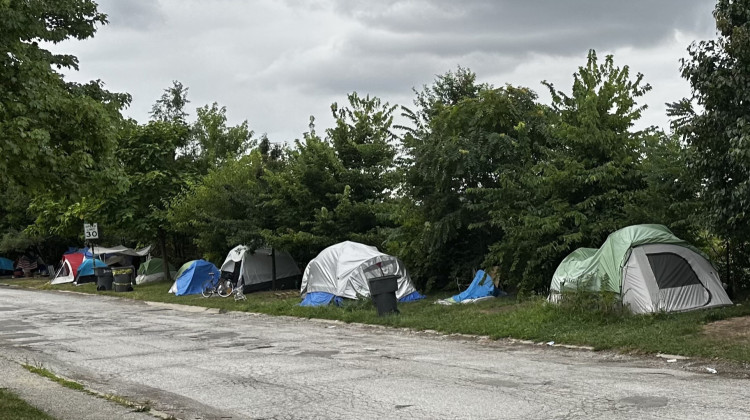
Marckus Williams (left) and Michael McFarland grew up in Indianapolis and have lived in the Arlington Woods area for years. They will be the owners of a new grocery store in the neighborhood, which is designated as a food desert.
Farah Yousry/Side Effects Public MediaMichael McFarland and Marckus Williams are packing up bags of chips, canned vegetables and diapers in their cars to deliver to a local homeless shelter.
The two guys are in their thirties and are childhood friends.
"We grew up together in the same neighborhood used to go to school together ride bikes, fix up cars, you know, just everyday friends," Williams said.
Living in the northeast side of Indianapolis, they have also seen the area change over time. As many as five grocery stores closed over the past few years, leaving thousands of residents struggling and feeling neglected.
Several years ago McFarland and Williams wanted to start a business together. They thought about opening a variety shop selling T-shirts and other things. But when they learned that their neighborhood is considered a food desert, they decided to start Wall Street Grocery, a small convenience store on 38th Street.
But things have not been not easy. They dealt with a razor thin profit margin and were continuously faced with distributor and supply chain roadblocks — with some distributors not wanting to come to their area and others delivering some fruits or vegetable on certain days and not others. Still, the store was a lifeline for many residents.
And McFarland and Williams stayed actively engaged in food access work with local community organizations and health departments.
"I guess our name just stuck in many people's ears," McFarland said.
That's what has led to their next big venture — they are shutting down Wall Street Grocery and are preparing to run and own a multi-million dollar full-size grocery store that will open next year on 38th Street and Sheridan Avenue.
Community-Led Corporate Social Responsibility Project
It started when family-owned medical device manufacturer, Cook Medical, decided to build its new plant near the Arlington Woods neighborhood. The plant will make needles, catheters and other medical devices used at hospitals all over the world. The new facility will generate more 100 jobs which was great news for this underserved community.
Still, one issue kept coming up.
"One of the things that we heard from so many people was that food access was a problem," Pete Yonkman, president of Cook Medical, said. "They had five grocery stores leave in the last five years and so you have 100,000 people with no access to food."
While it was never part of Cook Medical's initial business plan, they decided to spend $2.5 million to build a new grocery store to address food access issues — to serve the community and help retain local employees.
But being a Bloomington, Indiana-based medical device company, Cook Medical did not have the expertise of running a grocery store. Yonkman had the chance to meet McFarland and Williams at their convenience store, and that's when things fell into place.
"Here were two guys who were passionate about this, they grew up in the neighborhood, they want to do this for their community," Yonkman said. "So when you have that come together — you have opportunity and expertise come together — it would just sound like something we could do."
After the construction of the new grocery store, which will be called Indy Fresh Market, is complete, Cook will hand over operations and ownership to McFarland and Williams through a rent-to-own model. Though it's early to predict, McFarland said that with their prospective sales, it won't be long until they have 100% ownership of the store.
"It will be around two to four years," McFarland said. "That's not bad to own your own grocery store."
Local ownership of the store is sparking new hope among area residents. Yonkman said this kind of community-led approach will also make it easier for the store to shape its programs and operations to serve the community's specific needs.
"[McFarland and Williams] are committed to making space in the grocery store, so that local growers that they know can bring their produce in the grocery store," Yonkman said. "They can do education programs that teach people about foods they may have never seen before. We're partnering right now, trying to figure out a way to ensure that if people are prescribed food as medicine, they can get that paid for at the grocery store."
'Brilliant Model'
Harvard Business School professor Kash Rangan said this is one model of corporate social responsibility (CSR) that has the potential to "solve real problems".
"It's a brilliant model," Rangan said. "It's a unique model. But they need to take the extra mile in order for it to be successful."
That extra mile would be on-going financial and logistical support should the new grocery store owners need it down the road. He said if this happens, Cook Medical will be laying the ground for a cutting-edge CSR model. But he warned that if the company adopts a hands-off approach too soon, it could turn into another corporate vanity project.
From a public health perspective, the store's premise sounds promising, because having a full-size store will make it easier for residents to access fresh food. Also, Cook ensured the store will not sell alcohol or tobacco.
But if affordability and awareness are not addressed, the community may not see an improvement in its overall health, according to Niyati Parekh, a global public health professor at New York University. She said investing in programs to ensure affordable pricing of fresh food and creating incentives to encourage residents to spend their hard-earned dollars on healthier options could set this project apart.
"It could be that a grocery store could give incentives: the more fruits and vegetables you buy, the more free points, you'll get to go and buy more," she said. "There could be very creative ways."
As McFarland and Williams shut down their current convenience store, they realize a lot is hanging on their plans. For now, they are starting a shadowing program at local grocery chains and a training program with the National Grocers Association to prepare for their new role at Indy Fresh Market.
They said that their personal, vested interest in both the store and the community will play a big role in the future success of the store.
9(MDIwNjQ2MTYzMDE0NDM1NTQ0OThlYjEzMg001))
This story was produced by Side Effects Public Media, a news collaborative covering public health.
 DONATE
DONATE







 View More Articles
View More Articles




 Support WFYI. We can't do it without you.
Support WFYI. We can't do it without you.